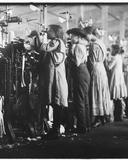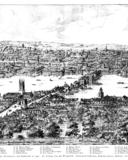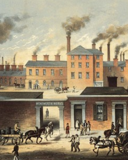MSc/ MPhil in Economic and Social History
Economic and Scoial History is the study of economic activities, institutional change, and social organization in the historical past. It encompasses a range of methods and topics but typically studies the past using quantitative rather than qualitative approaches.
The MSc and MPhil offer a unique framework for research training in economic and social history. You will be introduced to a wide variety of methods used in the study of economic and social history, as well as to the subject itself. The core papers provide an opportunity to evaluate a range of different qualitative and quantitative methodological approaches; they impart a common language, and create a close and friendly community, in which ideas are shared, and strong personal ties are forged, developing a community that provides a base from which to venture out and experience the intellectual, social and cultural rewards of Oxford.
The MSc is a one-year programme while the MPhil takes two years. Both can be taken as free-standing graduate qualifications, or used as a springboard for DPhil study.
Course Organisation
The programme consists of:
Core Courses
Quantitative Methods: Standard or Advanced Course
Economics for Economic Historians (elective)
History for Economic Historians (elective)
Option Courses
MSc in Economic and Social History
MPhil in Economic and Social History
These are usually taught in small classes. They are assessed either by a timed examination, or by one extended essay of 10,000 words, or by two extended essays of 5,000 words.
The advanced options of the History of Science and Medicine programmes are also available for Economic and Social History candidates; and candidates may choose – with the support of their supervisor – papers from other suitable MPhil programmes, such as Economics.
The following advanced option papers have been offered in recent years. Please note that not every advanced option paper will be available each year, and that the list of available options is subject to change from year to year.
The paper introduces students to working-class autobiography of the 18th and 19th centuries and explores the ways in which it can be used by economic historians. Students will consider the relative neglect of working-class memoir and the reasons why historians have been suspicious of such accounts especially when so few sources exist to provide insight into many aspects of everyday life. The strengths and weaknesses of the source will be discussed. The transition from using proletarian memoir as a literary source to searching it for the kinds of quantitative and qualitative evidence needed by social science historians will be discussed and defended. The course convener's recent book, Childhood and Child Labour in the British Industrial Revolution will be read as an example of a social science approach to the source and will be contrasted with David Vincent's Bread, Knowledge and Freedom, which represents a classic interpretation. The ways in which working people's accounts of their own lives can be used to unlock many outstanding questions in social and economic history will be pursued. Students will be required to study several working-class autobiographies and to develop their own ideas about how these might be used to cast light on the past as it was experienced by ordinary people.
The purpose of this course is to provide a comprehensive picture of the various schools of economic analysis by climbing the tree of economic thought from its very root. This tree started to grow out of the ground of philosophy almost 2,500 years ago in classical Greek Antiquity. The last 500 years though economic theory and practice has received great attention becoming an independent field of inquiry initially as an Art and now as a Science distinct of its first broader domain of moral philosophy. It has grown into such a mature entity with the utilization of the axiomatic method. It has developed many independent branches today (such as Finance & Econometrics) so that grasping a global picture of this structure is an important, but perhaps daunting task for students of economics. In this course we will learn how each major branch grew out of an old trunk, and we shall examine how the interaction of ideas within economics and between economics and other fields of science, helped to shape economic science. Finally, we will see how, over the past two hundred years, the discipline of economics has changed our view of societal evolution given that society itself has been changing as a result of advances in science and technology. After this course, one should have a grasp of various important currents of economic thought, their methodological stances and their leading contributors.
This course provides an introduction to the role of institutions – the “humanly devised rules of the game” – in long-term, historical economic growth. It brings together the theoretical assumptions about institutions adopted in the literature on economic growth on the one hand, and the empirical findings on these institutions by modern economic historians on the other. The course aims to introduce the main debates, conceptual tools, and empirical findings relevant to understanding how institutions influenced economic growth between the medieval period and the Industrial Revolution. The topics covered include (but are not limited to) serfdom, property rights, contract-enforcement institutions, state capacity, parliaments, guilds, and the family. The paper is assessed by a timed examination.
This course will examine the development of international money and banking in the second half of the twentieth century. Beginning with the legacy of the interwar depression, the course will follow a broadly chronological path to investigate the challenges and turning points in the evolution of the international monetary system and international banking and financial markets in the 20th century. A key theme will be the enduring challenges of regulation and supervision of international banking and the struggles to achieve international monetary coordination and cooperation.
Topics
- Unification
- Living Standards and Distribution
- Technical change
- Globalisation
- Social Capital
- Fascism
- Geography
- Banking
Over this period a great navy was the most expensive, elaborate, and technically advanced expression of national power. Anglo-French naval rivalry helped to generate the largest industrial complexes in the Western world, and spurred major developments in ship design. These immensely costly activities had massive implications for public finance, colonial and trading policy, and administrative practices. This course will concentrate on the economic and technological aspects of the subject, at both theoretical and practical levels, including contemporary perceptions of maritime strategy. Attention will also be given to timber supply, gunfounding, problems of manpower and recruitment, promotion structures, food, and health. While a comparative approach is a vital part of the course, a degree of concentration on one country will be allowed.
As emphasized in the rubric, this course seeks to encourage a strongly comparative approach, in a field where this can be achieved in a very precise and telling fashion; in this respect it is a study in method. There are many striking similarities between policies and practices in the two countries, which is hardly surprising when so many of the problems were common to all major naval powers. Yet the differing political, economic and social structures of Britain and France also led to many differences in the way they ran their navies and tried to use them. There were in addition important contrasts in the relationships between maritime and colonial policy and national wealth which operated in the two countries. Since most naval history has been written in rather narrowly military terms, many of these connections have not been brought out until recently, and have still to be absorbed into the general understanding of national history, even in Britain. From an apparently oblique approach the course introduces students to several of the most dynamic (and precarious) sectors of the respective economies, across a period which was crucial for their development. It also provides something of a case study in how a valuable secondary literature can be exploited to discuss topics going beyond those envisaged by the authors concerned.
The paper aims to provide an introduction, at an intermediate level, to a range of issues in European demographic history over the early modern and modern periods. It will offer a review of patterns of population growth and distribution, as well as the demographic processes of mortality, fertility, nuptiality and migration seen in their social, economic and political context. Coverage will include a survey of “classical” early modern European historical demography, and of the demography of economic, social and political modernisation in nineteenth- and twentieth-century Europe. Topics to be covered may include: sources and methods of historical demography (including family reconstitution, aggregative analysis and back-projection techniques); economy and population in pre-industrial western Europe and the concept of “demographic regimes”; patterns of marriage and household formation; marital fertility, birth intervals and the concept of “natural fertility”; epidemics, pandemics and infectious disease mortality; urbanisation and the “urban mortality penalty”; long-term population growth and the concept of “demographic transition”; the secular decline of fertility and mortality; war and population; forced migration and the demography of nationalism; population policy; the demography of totalitarianism.
This course concentrates on the major changes in French society over the 'long' seventeenth century, which saw the development of distinctive ancien régime structures in many areas. Particular emphasis will be placed on the relationship between state, church, and various elite groups, through which a set of overlapping hierarchies was strengthened. Attention will also be given to: popular culture and religiosity; the Catholic reform movement which sought to modify them; local solidarities and conflicts, including revolts; economic and demographic factors; the impact of royal policy on the localities; the development of a distinct elite culture.
Students are invited to study a crucial period in the emergence of the French 'absolutist' state, which is of the greatest interest and significance in terms of wider European trends. The focus will however be primarily on the underpinnings of the power structure, not on traditional political or administrative history. If increased royal power implied many severe clashes with local or particular interests, it was also based on a network of alliances and compromises with such groups, which set up many powerful interactions. The role of religion as an integral part of these structures will receive particular attention, since the régime cannot be properly understood without this crucial dimension. The complex history of royal fiscality is another key area, for changes here ultimately affected the lives of every person in France. The ultimate objective is to achieve a more 'structural' understanding of French society across the period, with its peculiar mix of static and dynamic elements.
This course is intended to explore the causes, and consequences for London, of its rise to dominance. It will begin with some consideration of European urban development more generally in the period, and the growth of other capital cities and ports, and then concentrate on London: its demographic and spatial growth; their roots in the city’s role as commercial entrepôt and as social and political capital; their consequences for social structure, balance of occupations, social problems, and mechanisms of government and social regulation. Particular attention will be paid throughout to the growing social and economic contrasts between City, West End, and eastern suburbs.
The aims of the course are to acquaint students with some of the key problems in the economic and social history of London in this period, to introduce them to some of the key sources for the study of the capital in this period, and to look at the city’s experience in a broader comparative perspective. All students will study the reasons for the city’s growth, placing it in the context of urban growth in England and the continent, and the demography of the city. Other topics for study will be chosen from the following menu: local government, social policy, crime, popular politics, the experience of women, the built environment, social topography, the role of the guilds, the experience of immigrants, foreign perceptions. At least one of the assignments must draw heavily on primary source materials.
This course examines the agricultural sector in the British economy since c.1800, with special emphasis on farming developments and on farmers. Much of the interest stems from the highly exceptional nature of the English farming system, which by 1800 had evolved into a tripartite structure - landowner, tenant farmer, and landless labourer. The average farm was large by international standards, and invested heavily in the technology produced by the Industrial Revolution. This system is contrasted with continental European systems, which retained large and relatively unmechanised peasant sectors until after 1945. Debates and topics to be examined include: the reasons for the disappearance of the English peasantry; the degree of success of Victorian farming; the reasons (mostly perennial) for and against having a policy of agricultural protection; the success of agriculture in feeding the nation in the Napoleonic and the two World Wars; whether the British entrepreneurial spirit was sapped by the attractions of investing in landownership; why farming has become such a capital-intensive and largescale business, especially since the Second World War; why contemporary farmers continue in business in the face of nugatory economic returns and growing environmental pressures.
The course will introduce students to the use of economic history theory, concepts and methods to explain key events and historical dynamics in Africa, such as state development, the slave trade(s), colonisation and the continent’s economic performance in the long run. It will consider Africa in the context of the Great Divergence debate, which seeks to explain when and why income gaps emerged between different regions of the world. We will also reflect on how African case studies can enrich the study of economic history more broadly.
This course provides a selective survey of two centuries of modern Chinese economic history from c. 1800 to the present day. It aims to shed lights on the critical questions in Chinese history across these two centuries: what explains the episodes of expansion and stagnation, the rise and fall (or even the occasional near collapse) of the Chinese economy, and ultimately China’s spectacular ascendancy as the world’s second largest economy during the past four decades. Historical memories, interpretation and memories are shaped and reshaped as a tool to legitimize status quo, resistance, reform, and revolution. Hence, the writing of Chinese history not only reflects but also structures ideology and institutions, which in turn affects trajectories of economic change. This course provides a selective survey on crucial debates with case studies particularly on historical turning points such as the opening of China during the mid-19th century, the collapse of Qing in 1911, the rise of the Communist regime in the 1950s, and the adoption of the reform policy since the late 1970s. It shows how the interplay between ideology and institutions and their persistence leave lasting imprints on Chinese political economy throughout the different regimes.
This is a course on global economic history, with two objectives. First, it aims to introduce students to recent debates in global economic history. Second, it aims to get students thinking about the relative merits of different approaches and different sources applied to key questions in global and international economic history.
Dissertation
MSc in Economic and Social History
MPhil in Economic and Social History
Handbooks for MSc & MPhil in Economic and Social History
Research Seminars
Oxford 1+1 MBA
The 1+1 programme is a unique, two-year postgraduate experience which offers you the opportunity to combine the depth of our specialised, one-year MSc in Economic and Social History with the breadth of Saïd Business School’s top-ranking, one-year MBA. As a result, you will embark from Oxford with the skills to translate specific domain knowledge into practical and innovative solutions to the many challenges facing our 21st Century world.
In addition, the Oxford Pershing Square Graduate Scholarship is available for up to five extraordinary 1+1 students who are committed to addressing world-scale social challenges. The Scholarship provides full funding for tuition, college fees and living expenses for both the MSc and MBA year.







